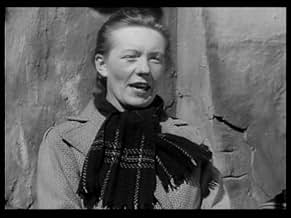Füge eine Handlung in deiner Sprache hinzuA Polish musician tells a young soldier about his wartime activity - setting up a street orchestra and taking part in the anti-German resistance movement.A Polish musician tells a young soldier about his wartime activity - setting up a street orchestra and taking part in the anti-German resistance movement.A Polish musician tells a young soldier about his wartime activity - setting up a street orchestra and taking part in the anti-German resistance movement.
Handlung
WUSSTEST DU SCHON:
- WissenswertesFirst Polish feature film made after the war that was released to the public. The first one that was made, Dwie godziny (1946) (1946), was only released in 1957.
- VerbindungenFeatured in Fejezetek a film történetéböl: A lengyel film (1990)
Ausgewählte Rezension
The Polish movie Zakazane piosenki (1947) was shown in the U. S. with the translated title Forbidden Songs. The film was directed by Leonard Buczkowski.
Remember that the movie was made just two years after WW II ended. Warsaw was still in ruins, and Poland was under Soviet control. The fact that the film was made at all is amazing.
Empires have tried to eliminate Poland as a nation for centuries. The Poles have continued to be a nation through bravery, art, music, and language.
The movie points out that the Polish people resisted the German occupation by singing songs making fun of the German occupiers, and by playing forbidden music. For example, Chopin's music was outlawed by the Germans. However, Poles would gather at "Chopin evenings," which was dangerous.
Because the movie is so old, and the equipment used was so basic, the print we watch is noisy and rough. If you're looking for a crisp, polished film, this isn't it. What you get in this film is a unique view into Polish history by people who had lived through it just a few years earlier.
We saw this movie in Rochester's wonderful Dryden Theatre at The George Eastman Museum. It was presented as part of the Polish Film Festival sponsored by the Skalny Center of the University of Rochester.
Forbidden Songs has a a fairly low IMDb rating of 7.1. I thought that it was better than that, and rated it 8.
P. S. What you can't see in the movie is the fact that Russia had invaded Poland from the east when Germany invaded it from the west. The reason there were Germans occupying Warsaw was because the Germans pushed the Russians out. It's true that at the end of the war the Russians pushed out the Germans, but they themselves were brutal occupiers. Poland has a very long and unhappy history, but it has managed to survive.
Remember that the movie was made just two years after WW II ended. Warsaw was still in ruins, and Poland was under Soviet control. The fact that the film was made at all is amazing.
Empires have tried to eliminate Poland as a nation for centuries. The Poles have continued to be a nation through bravery, art, music, and language.
The movie points out that the Polish people resisted the German occupation by singing songs making fun of the German occupiers, and by playing forbidden music. For example, Chopin's music was outlawed by the Germans. However, Poles would gather at "Chopin evenings," which was dangerous.
Because the movie is so old, and the equipment used was so basic, the print we watch is noisy and rough. If you're looking for a crisp, polished film, this isn't it. What you get in this film is a unique view into Polish history by people who had lived through it just a few years earlier.
We saw this movie in Rochester's wonderful Dryden Theatre at The George Eastman Museum. It was presented as part of the Polish Film Festival sponsored by the Skalny Center of the University of Rochester.
Forbidden Songs has a a fairly low IMDb rating of 7.1. I thought that it was better than that, and rated it 8.
P. S. What you can't see in the movie is the fact that Russia had invaded Poland from the east when Germany invaded it from the west. The reason there were Germans occupying Warsaw was because the Germans pushed the Russians out. It's true that at the end of the war the Russians pushed out the Germans, but they themselves were brutal occupiers. Poland has a very long and unhappy history, but it has managed to survive.
Top-Auswahl
Melde dich zum Bewerten an und greife auf die Watchlist für personalisierte Empfehlungen zu.
Details
- Laufzeit1 Stunde 37 Minuten
- Farbe
- Sound-Mix
- Seitenverhältnis
- 1.37 : 1
Zu dieser Seite beitragen
Bearbeitung vorschlagen oder fehlenden Inhalt hinzufügen

Oberste Lücke
By what name was Zakazane piosenki (1947) officially released in Canada in English?
Antwort



























